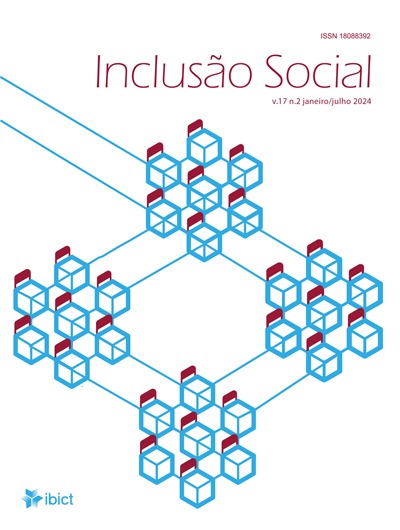Delimitation and Mitigation of Selected Gaps in Learning and Teaching
DOI:
https://doi.org/10.18225/inc.soc.v17i2.7004Palavras-chave:
teaching and learning gaps, educational ecosystem, meaningful learningResumo
This paper explores the complex challenges, persistent problems, and unexpected setbacks within the educational ecosystem that inevitably lead to teaching and learning gaps. It analyzes the entire extent of their occurrence chain, examining what causes these weaknesses and what measures can be taken to prevent them. The paper briefl y presents learning theories, followed by contributions from major educational thinkers, notably David Paul Ausubel (1918-2008) with his concept of meaningful learning, and some teaching and learning models, with emphasis on William G. Huitt’s (1995) “A systems framework of the teaching/learning process.” On the other hand, it discusses the constructs of teaching, highlighting that the process refers to the fl ow of knowledge from teacher to student, or broadly, from the educator to the learner. It features John Dewey (1859-1952), the educator who advocated for contextualized teaching tailored to individual student interests. The paper concludes by considering the main drivers of 21st-century education and proposes some initiatives to mitigate the identifi ed problems.
Referências
ALVARES, L. M. A. R. Perspectivas da sociedade da informação: abordagem cultural e cenários cotidianos. Museologia & Interdisciplinaridade, v. 10, n. especial, p. 20-38, 2021.
AUSUBEL, D. P.; NOVAK, J.; HANESIAN, H. Educational psychology: a cognitive view. New York: Holt, Rinehart and Winston, 1968.
CARR, H. Teaching and learning. Pedagogical Seminary and Journal of Genetic Psychology, [s. l.], v. 37, n. 2, p. 189–219, 1930.
CARROLL, J. A model for school learning. Teacher College Record, [s. l.], 64, p. 723-733, 1963. CHOMSKY, N. What is the common good? Nova York: Columbia University, 2014.
CROSS, K. P.; CONNER, E. Closing the gaps between teaching and learning. Journal of College Reading and Learning, v. 26, n. 1, p. 1–10, 1993.
CRUICKSHANK, D. R. Profi le of an eff ective teacher. Educational Horizons, [s. l.], v. 64, n. 2, p. 80-86, 1986.
DUMONT, H.; ISTANCE, D.; BENAVIDES, F. The nature of learning: using research to inspire practice. Paris: OECD, 2010.
GAGE, N.; BERLINER, D. Educational psychology. 5ª. ed. [s. l.]: Houghton Miffl in Company, 1992.
HUITT, W. A systems framework of the teaching/learning process. Educational Psychology Interactive. Geórgia: Valdosta State University, 1995.
LEMOS, C. F.; CASTRO, J. M.; DUSI, M. L. M.; PEREIRA, S. M. B. Princípios e Estratégias Educacionais: bases teóricas. Brasília: iNuTech, 2022.
MCILRATH, D. A.; HUITT, W. G. The teaching-learning process: a discussion of models. Educational Psychology Interactive: Readings in Educational Psychology, [s. l.], p. 45-49, 1995.
MINISTÉRIO DA EDUCAÇÃO. Base Nacional Comum Curricular (BNCC): Educação é a base. Brasília: [s. n.], 2018. Disponível em: http://basenacionalcomum.mec.gov.br/abase/. Acesso em: 22 maio. 2023.
PROCTOR, C. P. Teacher expectations: a model for school improvement. The Elementary School Journal, Chicago, v. 84, n. 4, p. 469–481, 1984. The University of Chicago Press.
SEQUEIRA, A. H. Introduction to concepts of teaching and learning. Social Sciences Education E-journal, Surathkal, p. 1-6, Sept. 2012.
SQUIRES, David A.; HUITT, W. G.; SEGARS, J. K. Eff ective schools and classrooms: a research-based perspective.
UNESCO - Organização das Nações Unidas para a Educação, a Ciência e a Cultura. Reimaginar nossos futuros juntos: um novo contrato social para a educação. Brasília: Comissão Internacional sobre os Futuros da Educação, UNESCO; Boadilla del Monte: Fundación SM, 2022. ISBN 978-65-86603-22-4.
VERMUNT, J. D.; VERLOOP, N. Congruence and friction between learning and teaching. Learning and Instruction, v. 9, n. 3, p. 257–280, 1999.
Downloads
Publicado
Edição
Seção
Licença
Copyright (c) 2024 Lillian Maria Araujo de Rezende Alvares, Marcello José Barbosa dos Santos

Este trabalho está licenciado sob uma licença Creative Commons Attribution-NonCommercial-ShareAlike 4.0 International License.
- A publicação se reserva o direito de efetuar, nos originais, alterações de ordem normativa, ortográfica e gramatical, com vistas a manter o padrão culto da língua, respeitando, porém, o estilo dos autores;
- As provas finais não serão enviadas aos autores;
- Os trabalhos publicados passam a ser propriedade da revista Inclusão Social, ficando sua reimpressão total ou parcial, sujeita à autorização expressa da direção do Ibict;
- Deve ser consignada a fonte de publicação original;
- As opiniões emitidas pelos autores dos artigos são de sua exclusiva responsabilidade;
- Cada autor receberá dois exemplares da revista, caso esteja disponível no formato impresso.





